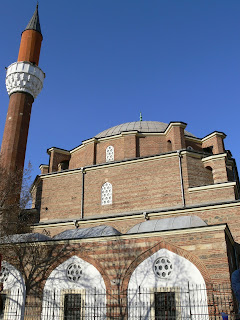The 15th-century Banya Bashi Mosque, in capital Sofia.
Islam is the largest minority religion in Bulgaria. According to the 2011 Census, the total number of Muslims in the country stood at 577,139,[1] corresponding to 7.8% of the population.[2] The Muslim population of Bulgaria, which is made up of Turks, Bulgarians and Gypsies, lives mainly in parts of northeastern Bulgaria (mainly in Razgrad, Targovishte, Shumen and Silistra Provinces) and in the Rhodope Mountains (mainly in Kardzhali Province).[3]
Muslims in Bulgaria
According to the census results for ethnicity, Muslims in Bulgaria were divided into the following groups in 2011:
- Turks - 444,434, of which 420,816- Sunni and 21,610- Shi'a
- Bulgarians (mostly Pomaks) - 67,350
- Roma (Gypsies) - 42,201
- Оverall - 577,139
Most of the Muslims in Bulgaria, a total of 546,004 people, are Sunni Muslims, the form of Islam which was espoused during the reign of the Ottoman Empire. Shi'a sects such as the Alians, Kizilbashi and the Bektashi also are present, however. About 27,407 Shi'a Muslims live mainly in the Razgrad, Sliven and Silistra provinces. I It should be noted that 31.1% of the overall Bulgarian population did not state a religion during the 2011 census and respectively 10% did not wish to answer the question on ethnic group. In the voluntary census section of self-determination 14,698 persons of the Turkish ethnic group have pointed the answer “no religion”, and 39,529 have not stated their religion.
Though the Ahmadiyya Muslim Community is a small sect in Bulgaria, their practice as Ahmadi Muslims is debarred due to the disagreement in belief between the majority Muslims.[4]
The largest mosque in Bulgaria is the Tumbul Mosque in Shumen, built in 1744.
History of Islam in Bulgaria
The first documented Muslim contacts with Bulgaria are dated to the mid-ninth century when there were Islamic missionaries in Bulgaria, evidenced by a letter from Pope Nicholas to Boris of Bulgaria that the Saracens must be extirpated.[5] During the time of Tsar Simeon insignificant Islamic influences on Bulgarian art began to appear, though it is believed that these can be traced to Byzantine influence.[6] Later during the 11th and 12th centuries, nomadic Turkic tribes such as the Cumans and the Pechenegs entered Bulgaria and engaged the Byzantine Empire. According to scholars, some of these were Muslim.[7][8]
Migration of Muslim Seljuq Turks to Dobruja during the 13th century is also mentioned.[9] In 1362, Ottoman Empirate captured the city of Adrianople (present-day Edirne) and within the next two years they had advanced as far as Plovdiv. The city of Sofia fell in 1385. Islam established in the conquered Bulgarian lands in the late 14th century at the Ottoman rule of the Balkans, its spreading grew until the Liberation of Bulgaria in the late 19th century after the Russo-Turkish War.[10] According to the office of the Grand Mufti in Sofia during the Turkish Ottoman rule in Bulgaria there were 2,356 mosques, 174 tekke, 142 madrasah and 400 waqf. After the Russo-Turkish War, many Islamic properties were either destroyed or confiscated for civilian use.[11] Currently there are 1458 mosques in Bulgaria.[12]
Like the practitioners of other beliefs including Orthodox Christians, Muslims suffered under the restriction of religious freedom by the Marxist-Leninist Zhivkov regime which instituted state atheism and suppressed religious communities. The Bulgarian communist regimes declared traditional Muslim beliefs to be diametrically opposed to secular communist ideology.[citation needed] In 1989,[13] 310,000 Turks fled Bulgaria as a result of the communist Zhivkov regime's assimilation campaign. That program, which began in 1984, forced all Turks and other Muslims in Bulgaria to adopt Bulgarian names and renounce all Muslim customs. The motivation of the 1984 assimilation campaign was unclear; however, many experts believed that the disproportion between the birth rates of the Turks and the Bulgarians was a major factor.[14] After the breakdown of communism, Muslims in Bulgaria again enjoyed greater religious freedom. Some villages organized Qur'an study courses for young people (study of the Qur'an had been completely forbidden under Zhivkov).[citation needed] Muslims also began publishing their own newspaper, Musulmani, in both Bulgarian and Turkish.
Lifestyle
In 2011, the first study in 25 years found that 48.6 percent of its 850 Muslim respondents described themselves as devoutly religious, 28.5 percent of which very. Some 41 percent never went to the mosque and 59.3 percent did not pray at home.[15] 0.5 percent believed that disputes should be resolved using Islamic Sharia law and 79.6 percent said that wearing a veil in school was "unacceptable."[15] 88 percent of respondents said they circumcised their boys and 96 percent observed Muslim burial practices for their relatives.[15] More than half of the respondents said cohabitation without marriage was "acceptable", 39.8 percent ate pork and 43.3 percent drank alcohol.[15]

No comments:
Post a Comment